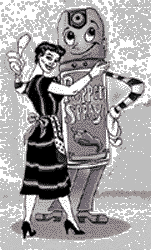

The Pepper Spray Times makes a modest effort to salute the lives of people whose contributions, for one reason or another, probably won't make the history books.
"Who are the people in the obituaries?"...we are sometimes asked. Thank you for asking. That's the reaction we wanted.
December and January, 2001
Robert Treuhaft, social activist
Alice Hamburg, peace activist
Thomas Victor Siporin, although childhood polio left him with a severely underdeveloped left arm, he was a star pitcher in high school and went on to register voters in the south in 1964 and spent the 70's working for legal services and defending UFW as well as AIM in Wounded Knee. He was also a painter appearing in over 40 exhibits, an author of plays, often involving disabled rights.
October, 2001 issue
Sylvia Weinstein, life-long social activist.
Gale Cincotta, "mother of the Community Reinvestment Act" who once threatened to hang a "loan shark" sign over the Federal Reserve Board office in Washington D.C. Housing and loan rights activist.
Raul Menendez Tomassevich, founding member of Cuban communist party, commander in the rebel army in the late 1950's.
Donald Woods, South African editor who fought apartheid, jailed and exiled for 13 years. Drew the world's attention to the case of slain black consciousness leader Steve Biko, who was arrested and beaten unconscious in 1977, driven naked and in chains 700 miles to the prison where he died. Woods was banned by the National Party government for his disclosures.
Theodore Kalman, spent more than 60 years opposing US military involvement, discrimination against blacks and gays - advocating for healthcare reform. Reporter for Daily People's world, editor of the Labor Herald, worked with Jessica Mitford on her book, "The American Way of Birth."
Chico Quele aka Francisco de Assis Santana, was instrumental in the Xukurus Indians fight to have ancestral lands made into reservation. He was gunned down by a shotgun at 56, probably by militant settlers resisting removal from the reservation.
Sept, 2001issue
Rene Dumont, champion of healthy farming, redistribution of wealth, first candidate to run for president of France on an environmental platform in 1974, eight years before the founding of the green party.
Carlos Giuliani, protester shot to death at a demonstration in Genoa, 2001.
Mimi Farina, musician, organizer of Bread and Roses, an organization which brought music to the sick and dying.
Phoolan Devi, the "Bandit Queen", born an untouchable in India, she responded to being gang-raped by an entire village by becoming a leader of her own gang of 'dacoits' (bandits), lived a life of violent crime, and eventually rose to become a twice-elected member of Parliament, assasinated at 37. Under constant threat of death, her contingent of bodyguards was reduced from 10 police officers to one the same year that she was elected to Parliament in a landslide.
July, 2001 issue
Alice Stuart, the first African American to seek admission to Virginia graduate or professional school in 1935. After her rejection the state established a tuition supplement fund for black students to attend school outside of Viriginia.
John Lee Hooker, blues musician.
Richard Werthimer, prominant attorney specializing in civil rights and labor law.
Jim McCormick, business agent hotel and restaurant workers union Local 2 (San Francisco). Elected on a reform slate after the union's unsuccessful 1984 strike.
June, 2001 issue
Harvey Richards, documentary filmmaker who made films which he shot, edited, recorded, scripted and distributed dealing mainly with 60's civil rights and peace movements, the environment and CA farmworkers' union activity.
Leon Sullivan, American clergyman who fought apartheid.
Ellis Barzillia, tenants and senior advocate.
Richard Leonard, radio broadcaster who introduced the use of the tape recorder for on-the-scene interviews.
March, 2001 issue
Helen Krimont Seitz : among the last survivors of the intellectual anarchist movement of the early 20th century. Lobbied for the teacherís union for the bill that would become social security and started some of the first child care centers way back during WWII so that women could work in wartime factories.
Annie Gibson: Last survivor among South Carolina petitioners who sued in the 1940s to end racial discrimination in public schools ( later merged with Brown vs the Board of Education) Sued to send her children to schools with the same amenities and resources as whites overturning the separate but equal rulings.
February, 2001 issue
Paul Wotman: attorney who litigated a case instrumental in ensuring gay rights.

